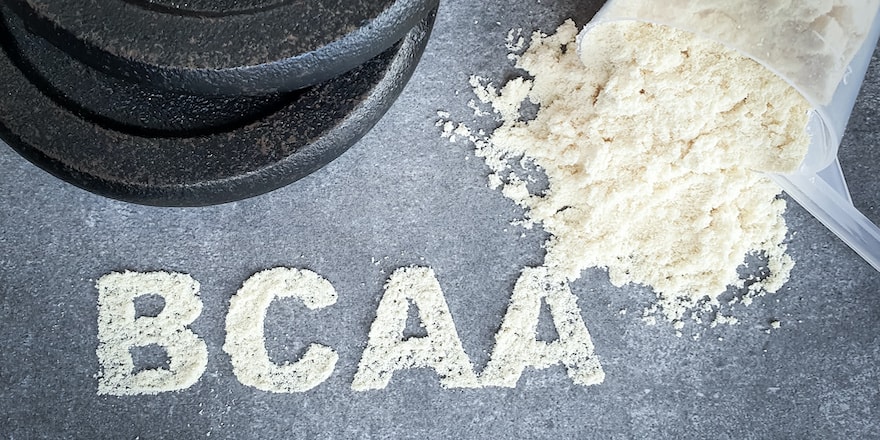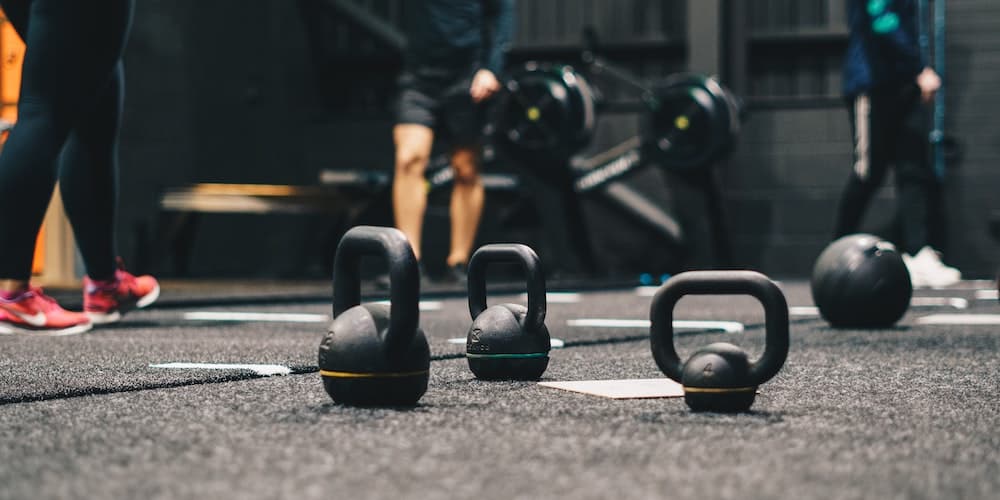Are BCAAs beneficial for bodybuilding?
Proteins that make up our muscle tissues
Branched Chain Amino Acids, or BCAAs, are three small molecules:
- Isoleucine
- Leucine
- Valine
BCAAs are subunits of proteins, which largely make up our muscle tissue.
Proteins are found in our diet. Eggs, meat, fish, dairy products, and legumes are our best sources of protein.
It’s also important to know that all protein foods contain our famous BCAAs, in varying amounts.
Supposed benefits
Thus, BCAAs are the main subunits of our muscle proteins. It could be assumed that increasing our BCAA intake would help develop muscle mass, improve recovery, and possibly increase strength, as is often claimed.
The contractions and relaxations of muscle fibers during physical exertion degrade the muscle. The more intense and repeated the effort, the more the fibers become fragile and eventually break down. This is known as muscle catabolism during exertion.
Muscle proteins release leucine, isoleucine, and valine, our 3 BCAAs, during this catabolism.
Weight training leads to significant muscle fatigue accumulation and a low-grade inflammatory response. It also increases nitrogen waste in the bloodstream.
The use of BCAAs can then make sense to reduce these phenomena. This has been studied by over 50,000 researchers.
What the science says
These 3 amino acids, primarily leucine, are primarily broken down during sports physical activity.
Based on this observation, a large number of studies have attempted to demonstrate that consuming BCAAs around exercise could slow down this degradation. And increase performance during exercise, as well as recovery.
As stated by this meta-analysis of randomized controlled trials published in June 2021, the only presumed benefit of this supplement would be to reduce muscle inflammation associated with resistance training like bodybuilding.
In other words: to improve muscle recovery.
What the European regulations say
When I seek to determine if a dietary supplement is truly effective, I always examine European regulations.
Why? Because these regulations closely scrutinize all scientific studies related to a supplement. If these studies confirm a supplement’s effectiveness, Europe validates the legitimacy of that supplement.
Currently, there are no claims regarding BCAAs. Simply because there are as many studies showing positive effects as there are studies showing no effect.
BCAAs consumed in isolation are therefore not recognized as effective for increasing muscle mass, improving recovery, or gaining strength.
Read also | How to choose the best BCAAs according to a dietitian
Is BCAA consumption dangerous?
Are BCAAs considered to be doping?
Currently, WADA, the World Anti-Doping Agency, does not consider BCAAs as a doping product. They can thus be used in the context of competitions and high-level sports practices.
Are BCAAs dangerous to health?
To date, no studies have shown adverse effects from BCAA consumption in healthy individuals.
However, if you have health issues, particularly kidney failure, I advise you to consult your doctor. BCAAs are also not recommended for children, adolescents, and pregnant or breastfeeding women.

So, BCAA or proteins?
Proteins versus BCAAs
Proteins are truly effective for the development and maintenance of muscle mass. All studies confirm it, and European regulations have long validated the beneficial effects of proteins on increasing muscle mass and strength.
Especially since dietary proteins all contain BCAAs. So the answer is simple: prioritize proteins over ‘isolated’ BCAAs to achieve your goals.
What are the recommended dosages?
First of all, it’s important to know that the body cannot produce BCAAs. Leucine, isoleucine, and valine are among the 8 amino acids known as “essential”. These must necessarily be supplied by the diet.
This comprehensive scientific study published in 2019 shows that proteins have very beneficial effects for athletic individuals.
Therefore, it is your protein intake that needs to be monitored and not your BCAA intake:
- The protein recommendations for athletic individuals are 1.4 g (endurance) to 1.8 g (strength) of protein per kg per day.
- The protein recommendations for a non-athlete are 1 g of protein per kg per day.
In summary, for a 75kg bodybuilding athlete looking to develop muscle mass, an intake of 135 g per day is ideal.
How to find quality BCAAs?
First BCAAs of dubious quality
This dietary supplement has a controversial history, as the first BCAAs on the market were derived from animal by-products: feathers, animal skin, hair… And this is often still the case.
And the quality of the BCAAs currently available is not yet optimal. Also, be aware that BCAAs are provided in sufficient quantity if your diet is high-protein.
Indeed, protein-rich foods (eggs, meat, fish, dairy products…) all contain BCAAs in large quantities. This largely meets your needs for muscle development purposes.
Beware of marketing
When you compare different BCAA references, you will see that the sales arguments for each brand will be different. And for good reason, since there is no scientific proof of their effectiveness nor any nutritional claim validated by Europe, each brand attempts to make them appealing in its own way.
Some will tell you they help to develop muscle mass, others to cut or increase your muscle strength, reduce your fatigue… I agree with you that it is difficult to have a unanimous message when there is nothing precise to say.
An absurd differentiation
Are you more 2:1:1 or 8:1:1? With or without flavor? Prefer capsule or powder? Brands are not lacking in imagination and try to diversify the BCAA offer to make them increasingly appealing.
BCAAs with unknown origin, Vegan BCAAs… This supplement, which has never shown proven efficacy, is nevertheless a leader in dietary supplements consumed in fitness centers.
Unfortunately, the consumer, often young, finds themselves in the dark when deciding whether or not to use BCAAs.
BCAAs are very profitable, plain and simple. Selling between €70 and €200 per kilo a product that costs less than €10 per kilo to produce is certainly very appealing…
You won’t find these figures on the web, and I share them with you in all transparency so you know what to expect!

What are the best sources of BCAAs?
Whey, an important source of BCAAs
If you wish to supplement your diet with BCAAs, know that 30 g of native whey isolate, the best quality whey that I recommend in this article, already provides you with 7.5 g of BCAAs. These BCAAs are of good quality because they come from fresh milk and not from cheese industry waste.
Two shakes will provide you with a supplement of 15 g of BCAAs per day. That is the recommended intake according to the few scientific studies that discuss the benefits of BCAAs in reducing muscle inflammation in the context of resistance training.
Read also | Best whey: 10 brands tested by a dietitian-nutritionist
I am vegetarian, what should I do?
If you follow a vegetarian diet, simply turn to plant proteins which will also provide their amounts of BCAAs. But it can be very challenging to meet your protein needs on a vegetarian diet.
Legumes, although relatively high in protein, have lower CUDs (Coefficient of Digestive Utilization) and ICs (Chemical Indices) for proteins compared to animal proteins.
However, plant-based protein powders have very high absorption rates and chemical indices, making them digestible and very effective for supplementing protein intake.
Read also | Choosing the right plant proteins in powder form according to a pharmacist
Animal proteins versus plant proteins
Finally, remember that the assimilation and use of milk proteins by our body is always better compared to plant proteins (soy, pea, and other plant proteins).
For the simple reason that animal-origin proteins are more similar to the proteins that make up the human body.
If you are not on a specific diet, you should lean towards a low-lactose dairy protein like native whey isolate. Its digestion will be even better.
My final tips
💡 Should you consume BCAAs during strength training?
Yes, but I strongly advise you to invest in a native whey isolate, which you can easily find around €30 per kilo, and it will be much more effective than “isolated” BCAAs in reaching your goals.
💡 Mass gain occurs at rest
If your goal is to build muscles, remember that your training is just as important as your recovery for optimal muscle anabolism. Indeed, it is at rest that the muscle regenerates and develops. I therefore recommend at least 2 days of rest per week.



